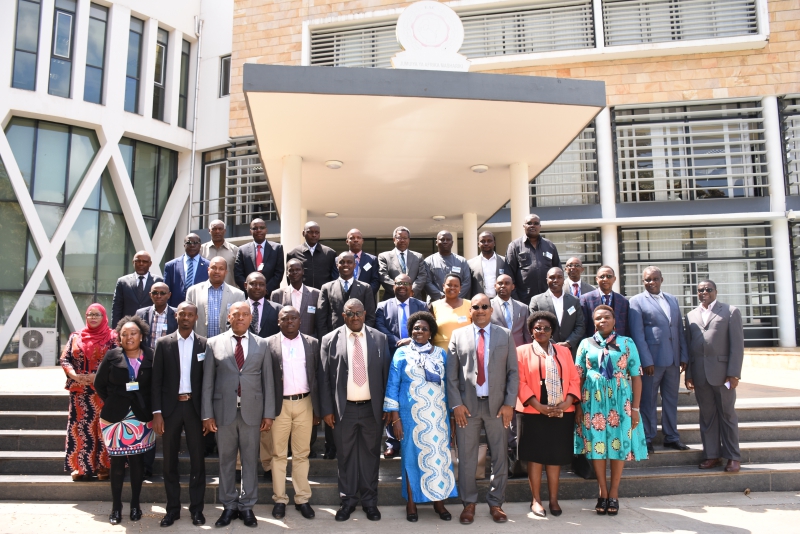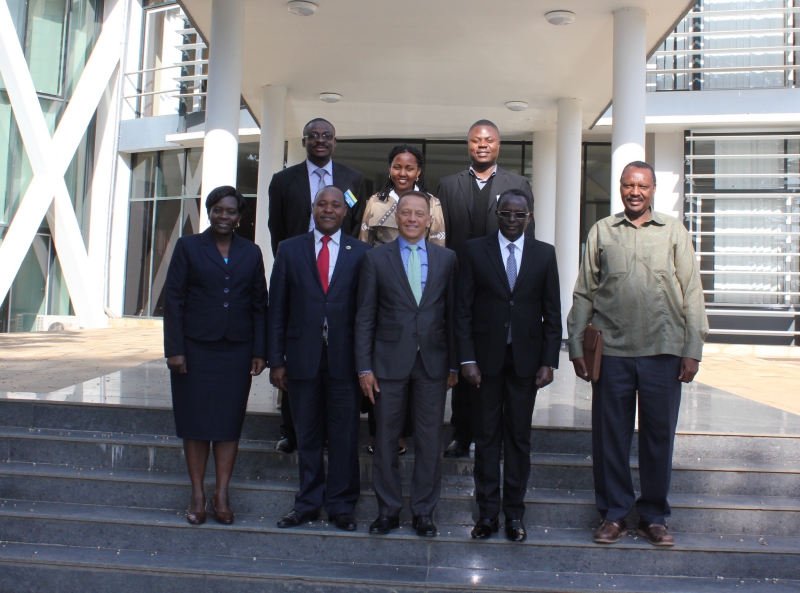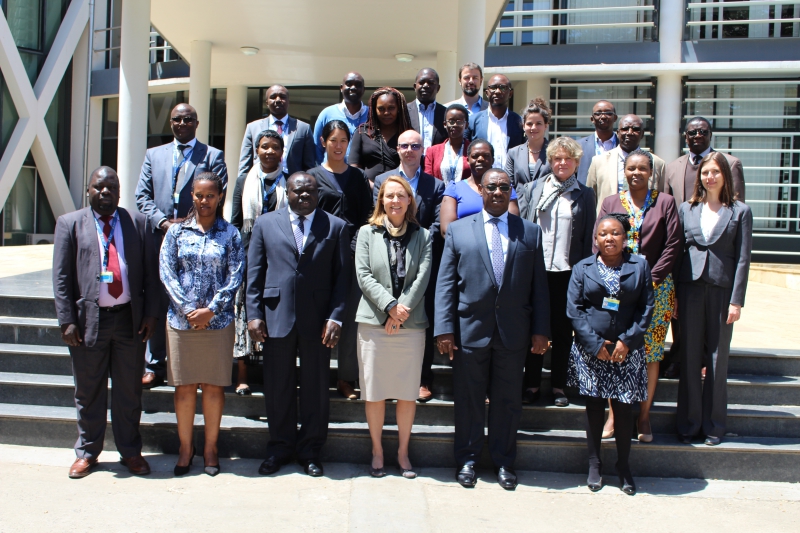
EAC Organs and Institutions’ Pre-Budget Conference for FY 2019/2020 ongoing in Arusha
East African Community Headquarters, Arusha, 30th August, 2018: A two-day Pre-Budget Conference for the EAC Organs and Institutions for the Financial Year 2019/2020 is underway at the EAC Headquarters in Arusha, Tanzania.
The Conference is being attended by Members of the General Purpose Committee of the East African Legislative Assembly (EALA), Permanent and Principal Secretaries, senior officials from Partner States, Heads of EAC Organs and Institutions, and staff from the Secretariat.
Gracing the opening session of the Conference was Uganda’s Permanent Secretary in the Ministry of East African Community Affairs, Mrs Edith Mwanje, who commended the Secretariat for convening the meeting and involving key stakeholders in the Community’s Budget Cycle.
Addressing the delegates, Hon. Abdikadir Omar Aden, the Chairperson of the Committee on General Purpose of EALA noted that EAC had registered commendable milestones which should be applauded and up-scaled to greater heights and achievements. However, he noted that there were challenges impacting on the smooth operation of projects and programmes, which need to be addressed urgently.
He disclosed that the Assembly was giving notice of the intention to, among others, introduce a Public Finance Management Bill that will fill all the gaps existing in the EAC Budget Act of 2008, whose provisions are continually disregarded.
He disclosed that EALA will pursue changes in recruitment (transparency), Human Resource matters in the Community as well as conditions of service of the staff of the Community, which fall under the mandate of the Committee on General Purpose. “It is no longer business as usual where policy decisions are made at the behest and will of particular entities, groups and even individuals”, noted Hon. Abdikadir Omar Aden.
The Chair of the General Purpose Committee pledged to lay a firm foundation for better cooperation between all stakeholders, Organs and Institutions of the Community.
On his part, Eng. Steven Mlote, the Deputy Secretary General in charge of Planning and Infrastructure, who represented the Secretary General, cited achievements made in the implementation of programmes under the four Pillars of EAC integration during the Financial Year 2017/18.
These included, among others, completion of the necessary arrangements for roll-out of all products within EAC to be transacted under the Single Customs Territory; enhancement of application of the Electronic Cargo Tracking System on the Northern Corridor; enhancement of customs automation in all Partner States through upgrades of the Customs systems and migration to more advanced and robust systems; and initiation of an inter-connectivity program to address weaknesses in customs valuation and monitoring of goods across the region.
The region made stride in completion of the construction of twelve (12) One Stop Border Posts (OSBPs). These include (Holili/Taveta; Rusumo; Ruhwa/ (BR)/Ruhwa (RW); Nemba/Gasenyi; Kagitumba/Mirama Hills; Busia (KE)/Busia (UG); Mutukula (TZ)/Mutukula (UG); Malaba (KE)/Malaba (UG); Kabanga/Kobero; Horohoro/Lunga Lunga; Sirari/Isebania; and Namanga).
He disclosed that to promote the region’s textile and leather industries, the review of the EAC Common External Tariff (CET) was underway, to among other outcomes, set rates that will provide incentives for value addition, as well as cushion the industry from dumping. On the other hand, Partner States had taken measures to promote the textile and leather sectors through enforcement of conformity with Sanitary and Phytosanitary (SPS) requirements, particularly for the used under-garments and synthetic shoes.
The Deputy Secretary General highlighted the challenges impacting on implementation of Community activities that include slow disbursement of funds by Partner States. “For instance, the status of contribution by Partner States towards the EAC main budget as of 29th August, 2018 was at 6% per cent, thus seriously affecting implementation of the activities planned for the first Quarter of the Financial Year 2018/19”, asserted the EAC official and urged Partner States to remit their contributions in time to enable the EAC Organs and Institutions deliver on their mandates.
The Deputy Secretary General proposed seven (7) global priority areas during the Financial Year 2019/20 to be considered by the Conference namely; consolidation of the Single Customs Territory (SCT) to promote intra-EAC trade; development of regional infrastructure (roads, railways, ports, energy, etc.); and enhancement of free movement of all factors of production and implementation of commitments on other areas of cooperation as envisaged under the Common Market.
Others include enhancement of regional industrial development through investment in key priority sectors, skills development, technological advancement and innovation to stimulate economic development; implementation of the Roadmap towards the EAC Monetary Union; promotion of regional peace, security and good governance, and completion of the Constitution-making for the EAC Political Federation; and finally institutional transformation, focusing on implementation of the Institutional Review recommendations, alternative financing and improvement of performance management at the EAC Organs and Institutions.
It is expected that at the end of the Conference, consensus and agreement will be developed in relation to the Community’s Global and Sector-specific priority areas for the FY 2019/20.
-ENDS-
For more information, please contact:
Mr Owora Richard Othieno
Head, Corporate Communications and Public Affairs Department
EAC Secretariat
Arusha, Tanzania
Tel: +255 784 835021
Email: OOthieno [at] eachq.org
About the East African Community Secretariat:
The East African Community (EAC) is a regional intergovernmental organisation of five Partner States, comprising Burundi, Kenya, Rwanda, Tanzania and Uganda, with its headquarters in Arusha, Tanzania.
The EAC Secretariat is ISO 9001:2008 Certified

